Text
Post Six: Citations and Sources
Angelo, Megan. "Call Me Back, Hollywood: What It's Like to Be a Black Woman Trying to Make It in TV." Glamour. Glamour Magazine, 04 Apr. 2016. Web. 27 Apr. 2017. <http://www.glamour.com/story/why-are-there-so-few-black-characters-on-tv-shows>.
Lauzen, Martha M., Dr. "It’s a Man’s (Celluloid) World: Portrayals of Female Characters in the Top 100 Films of 2016." It’s a Man’s (Celluloid) World: Portrayals of Female Characters in the Top 100 Films of 2016 (2017): 1-4. Web. 27 Apr. 2017. <http://womenintvfilm.sdsu.edu/wp-content/uploads/2017/02/2016-Its-a-Mans-Celluloid-World-Report.pdf>.
Lorde, Audre. "The Uses of Anger: Women Responding to Racism." Blog post.Blackpast. N.p., n.d. Web. Apr.-May 2017. <http://www.blackpast.org/1981-audre-lorde-uses-anger-women-responding-racism>.
Mask, Mia. Divas on Screen: Black Women in American Film. Urbana, IL: U of Illinois, 2009. Print.
Molina-Guzman, Isabel. "#OscarsSoWhite: How Stuart Hall Explains Why Nothing Changes in Hollywood and Everything Is Changing." Critical Studies in Media Communication 33.5 (2016): 438-54. Web. Apr.-May 2017.
Moraga, Cherrie, and Gloria Anzaldua. This Bridge Called My Back: Writings by Radical Women of Color. 4th ed. Albany, NY: SUNY, 2015. Print.
Shani. "A Girl Like Me Featurette." YouTube. YouTube, 07 Dec. 2006. Web. 27 Apr. 2017. <https://www.youtube.com/watch?v=PAOZhuRb_Q8&mode=related&search=>.
Thompson, Arienne. "Where Are the Black Women in Hollywood?" USA Today. Gannett Satellite Information Network, 17 Dec. 2013. Web. 27 Apr. 2017. <https://www.usatoday.com/story/life/people/2013/12/17/hollywood-turns-a-blind-eye-to-black-women-in-film-tv/3443751/>.
0 notes
Photo
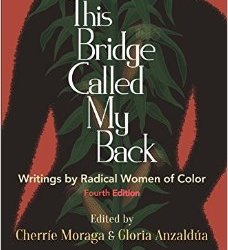
Post Five: Relatable Class Texts
The two in class texts that I thought really related to my topic were the poem The Welder by Cherrie Moraga from This Bridge Called My Back and The Uses of Anger: Women Responding to Racism by Audre Lorde.
Audre Lords talks about anger that forms from being in oppressive systems. That anger is important because it warrants change. In the end, it helps everyone since the voice that emerges from that anger is criticizing and calling out what’s wrong in our society. People can’t fix the problem until they know what the problem is.
I think The Welder is relevant because the poem talks about bridging the gap between different races and becoming a whole community. It’s about seeing past the barriers and systematic structures that are designed to separate us. I think the message to take from it coupled with Lorde’s statements on anger mean to make a difference in the world and to not remain silent.
We have to stop waiting for the change we want to see and start taking action. If there aren’t enough well developed African American characters then we need to start writing and making them. There aren’t enough WOC writers and producers and directors so become one. If studdios don’t want to accept your script and don’t want an African American Woman as the lead make an independent film, raise the money and release it, or find one that will. Nothing’s going to change if we don’t make it and call attention to the injustices. Even the film audience plays a part because they have to go out and support these film and projects because when studios see these movies make money they don’t see it as a gamble from a business perspective. And if financially they can’t make a lot give reviews of the film spread the word on how good they are and maybe they can win critical acclaim. Movies like Hidden Figures, Fences, Moonlight, and Loving got Oscar attention and buzz which makes Hollywood see that good movies are good movies. Beyond Skin tone and gender if a story is engaging and evokes emotion then people will go see them.
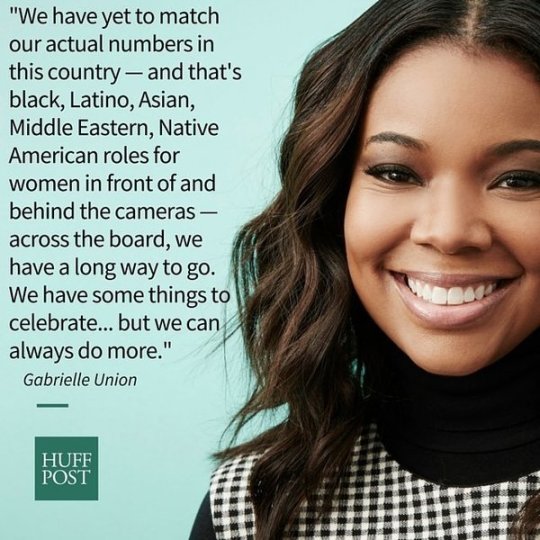
#thisbridgecalledmyback#audrelorde#usesofanger#thewelder#respondingtoracism#cherriemoraga#genderandwomenstudies#africanamericanwomeninfilm
0 notes
Photo

Post Four: Valuable Black Actresses
Social injustice and institutionalized racism play a major role in the under representation of female African American characters because they both hinder equal access to opportunity. There are many actresses that paved the way for black women to come because they gave people exposure to the different sides of us.I will mainly focus on Dorothy Dandridge because she was a pivotal movie icon.
A book I read on the subject was Divas on Screen: Black Women in American Film by Mia Mask which really dove into Dandridge’s career. Dorothy Dandridge essentially paved the way for women of color to enter the film industry due to her ability to appeal to mass audiences without enforcing negative stereotypes of black women.She was a major female figure or star in a time where America was still divided by segregation. The sophisticated and elegant persona she portrayed contradicted the image many people of the time had of Black women. Not only did she have several leading roles during her career but she also forced the public sphere to recognize that black women didn’t embody the negative attributes that were associated with people of color and in fact refuted black inferiority in general.

During the 1950s there was an interesting parallel between society’s views on women as wife and mother and women as sexual objects. On the one hand, women were expected to be pure and wholesome since they were the head of the household while on the other hand, the image of the pin-up started to become prevalent in society as well. So not only were women expected to be virtuous angels of the house but they were also supposed to arouse the male fantasy of a seductive and sexy calendar girl. This created an interesting paradox since both images of women seemed to be contradictory. This led to many stars like Marilyn Monroe, who Dandridge is often compared to, to become sex symbols which the author attributes to a Hollywood that need to result in risqué content to revive the financially struggling film industry of the time. As we can see from the blog post on Black Women’s stereotypical character tropes we can see that this become problematic later in history since many portrayals of WOC can’t escape that sexualization and racial fetishism. Despite her talent she found it very hard to obtain dramatic roles and was often not taken seriously so she was forced to uphold her sexy image. Women of color who take these roles are not less than and are not trying to support oppression. I think Hollywood’s fetishism shows how Black actresses choices are limited.
1 note
·
View note
Photo
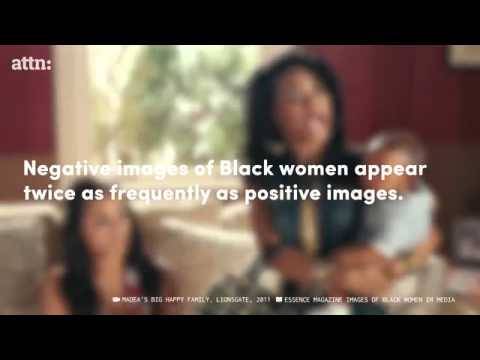
Post Three: Negative Stereotypes and Representations
There are four main stereotypes of black women that are constantly being perpetuated in media. These insulting and even damaging stereotypical roles Black Women are forced to play are the maid or housekeeper, black friend, hypersexualized woman or Jezebel, and the angry black woman. Most of these character tropes are one dimensional and only showcase a surface layer attribute that is exaggerated. There are examples of actresses taking advantage of the conventions that go along with a certain stereotype and adding layers through their acting talent and their research into the subtext of the character. Addressing there stereotypes is in no way bashing the actresses that have taken these roles because in my next post I will be discussing how many of these women have paved the way for women of color in cinema. For this post I’m going to be focusing on the black friend and angry black woman stereotype.
I want to start of with what could be consider the token black friend. In film there are often characters that are Black friend of the main character. Like the maid or housekeeper trope, the black best friend is mostly there to nurture and guide white characters. They often don't come off as real or organic in movies because it seems like Hollywood often puts them there to appear inclusive. Having them there is a nod to the black community as a way to say they thought about us and we should be grateful. The black friend is a mandatory addition to a group of friends so they seem diverse. I'm not saying this particular trope is bad and revolting but I think it's important to raise the question when do black women get to be more than the side character sometimes. Is it too much to ask that sometimes a Black Woman can be the lead of a movie from time to time and not always have to stand in the background and give advice like they are a therapist or life coach.In my opinion it is positive to see more black characters and it nice to see them portrayed in a more positive light but this goes into the concept of tokenism.

Next would be the notorious stereotype of the angry Black Woman. I’m personally really tired of Black women being portrayed in these movies as bitter and angry. They often are being mean to men in general and have unrealistic expectations for what a man should be. This is a really common and overused trope that casts black women in a really negative light. She is an unhappy person, and channels her frustrations on by criticizing others especially African American men. In a way it’s like Black women are being punished by the film industry for not fitting the traditional role of a woman. This harsh portrayal of African American women comes from the unfair gender expectation that says that women are weak, passive, and non-threatening so Black women who are famous for speaking their minds and stating their opinion are demonized. An example of this would be from the film Deliver Us From Eva in which Gabrielle Union plays an angry black woman who is seriously mean. She is very over protective and overbearing towards her sisters and their love lives to the point that the boyfriends feel like this is the only way she will stay out of their business. There is a famous scene from the film where she chews out the owner of a restaurant because she is a health inspector and doesn’t find the place to be up to par.
This characterization is very problematic because media whether we want to admit it or not highly affects the public’s view. Constantly having black female characters like this reinforces the notion that all black women are like that. A real-life example would be when my Filipino friends who when they first came to America were cautious of Black people in general because of all the stuff they had “learned” about Black people from music videos, television, and film. This shows how people start to blur the lines between what is a fictional portrayal in film and take it as fact. People who don’t get the chance to interact with African Americans and Black women take these images and see them as true because not everyone can take the time to research outside of these mediums.

0 notes
Photo
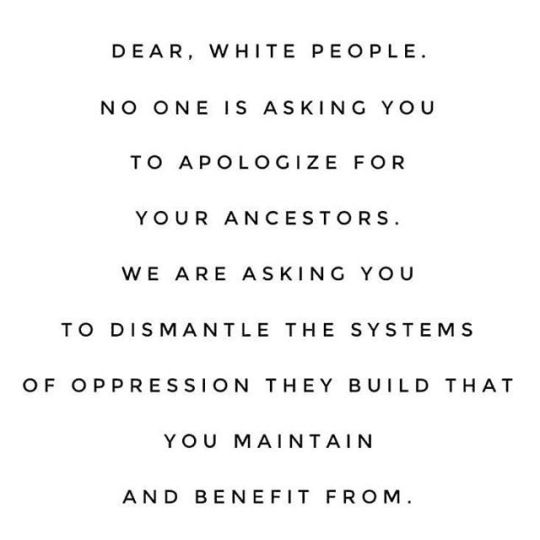
Post Two: Systematic Oppression
It's a well known fact that the film industry is male dominated and centered around men. It’s difficult for women, even harder for minority women or women of color, to be cast in main roles. In a study by Dr. Martha M. Lauzen, Center for the Study of Women in Television and Film, she states that in the top 100 films of 2016 76% of female characters were white, while only 14% were Black. I would argue that there are three systematic obstacles African American Women face that prevent and obstruct their exposure in movies. Those three are racial and sexist bias, Hollywood’s beauty standards, and the constant portrayal of white characters as the everyman. For the purpose of this post I’m going to focus on the first two.

Racial and sexual bias or prejudice is extremely prevalent in the film industry whether people want to admit it or not. Not only are there not strong female characters in general but on top of that there are even less of those characters that are African American. In the article Where are the black women in Hollywood? by Arienne Thompson she asks several African American Actresses why they think there aren’t more roles for Black women. Nia long was quoted saying that "We're not considered for the same roles. We're not paid the same. That's just the truth." when comparing herself to white actresses like Cameron Diaz and Resse Witherspoon who both commonly work in similar genres to her, comedy and romantic comedies.It’s laughable to think that some people with the same train of thought as the character being portrayed in the Gif really think that race and gender play a major role when it comes to who gets more access to jobs and career opportunities.
In terms of beauty standards, the media places a lot of emphasis on women’s looks and sex appeal because women throughout history have been held up to unrealistic ideals. Every woman is burdened with the image of a perfect woman and aim for the perfect body that we see in magazines, films, and television all the time. This ideal is even harder to attain for women of color and black women because often whiteness is associated with beautiful. In order to be deemed attractive in our society, African American women often have to conform and alter their weight, hair, and even skin color to fit in and look more like a white woman.In another article I read called Call Me Back, Hollywood: What It's Like to Be a Black Woman Trying to Make It in TV by Megan Angelo she talked with a young an up and coming Black actress who is trying to break into television, Dionna Reasonover, about her struggle when it comes to being cast in projects. Reasonver is hastily trying to get ready for an audition she has right after the interview so Angelo sees her plethora of wigs to which Reasonver replies that she has to look like whatever the casting directors are looking for. She confesses that characters that are described as sexy or hot in the script rarely call for her natural hair to be shown. Instead of her puffy curls she is expected to have silky and straight since that type of hair is the embodiment of perfect hair. Honestly I wear wigs too from time to time because I’m lazy some days or I’m running short on time and can’t do my hair. Either way I think her natural hair is beautiful and should still be considered beautiful because often Black women are told that their Afros or curls are unprofessional and are discouraged to wear their hair that way. We are often pressured to change to try to fit a standard of beauty that says that everything that is not like a white woman’s isn’t acceptable.

Picture of Dionna Reasonover
Besides hair, weight and skin color are also main reasons for why Black women don’t fit the common perception of beauty. African American women often are curvy and the word thick is often associated with their voluptuous figures. It’s no secret that the pressure to be thin is dominant in Hollywood since young actresses are expected to look like models. This along with the pressure to be light can create a skewed and negative body image. In a clip I saw on youtube from the documentary A Girl Like Me, young African American youths talked about the negative criticisms they heard about the beauty of black women growing up. Most of them talked about hair but a few also mentioned how their skin color sometimes made them feel ugly or less than because they were teased for being dark. A lot of the perception of beautiful skin is associated with whiteness which is seen as superior or better to a dark complexion. Lighter skin is often prized and thought of as more desirable since what we see in media is from the male perspective, white males, and caters to what they would find attractive; which would be a white woman features that are similar.
1 note
·
View note
Photo
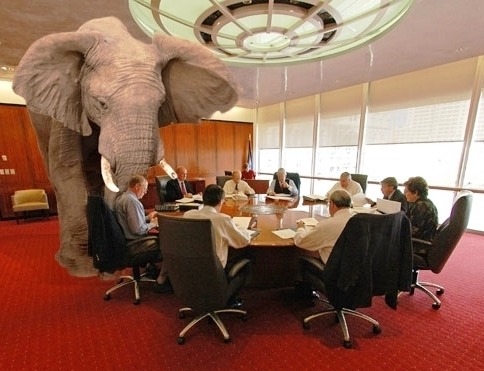
Post One: Introduction
"When there's an elephant in the room, you can't pretend it isn't there and just discuss the ants."- Ellen Wittlinger
For a while now, I’ve wanted to address the metaphorical elephant in Hollywood’s studio; the overwhelming lack of representation for women of color. After talking with friends, reading comment sections, internet forums, watching videos, and documentaries on the subject, it became apparent that not a lot of people could see the elephant. I’m an English major with a concentration on digital media so I’ve been taking a lot of film classes and to my disappointment there are very few female lead movies and even fewer films with a Black woman as the main character. At some point, I tried to ignore the question at the back of my mind that that asked why aren’t there more African American Women in film? It kept creeping into my thoughts more and more because a lot of the classic and worth watching movies we analyzed in these film classes centered around a white male protagonist and the audience for most of the time had to look from the male perspective.
I’ve been tasked by my gender and women studies professor to take up a research project that sheds light on a problem that contributes to oppression on the basis of gender. Naturally that question in the back of my mind rose to the top again and I immediately knew this was something that I really wanted to talk about and discuss. I decided to do a text based blog with images opposed to a traditional paper because film is a visual medium so it’s only natural to include visual cues and evidence to effectively display what I’m talking about. Overall this blog is a means to investigate why African American women are essentially invisible in the film industry. To effectively do this I want to analyze the systemic roadblocks involved, some common stereotypical representations of Black women in film, actresses that have tried to make their mark in the film community, and what can be done to fix this problem.
#introduction#womeninfilm#africanamericanwomeninfilm#womenofcolorinfilm#genderandwomenstudies#elephantintheroom
0 notes